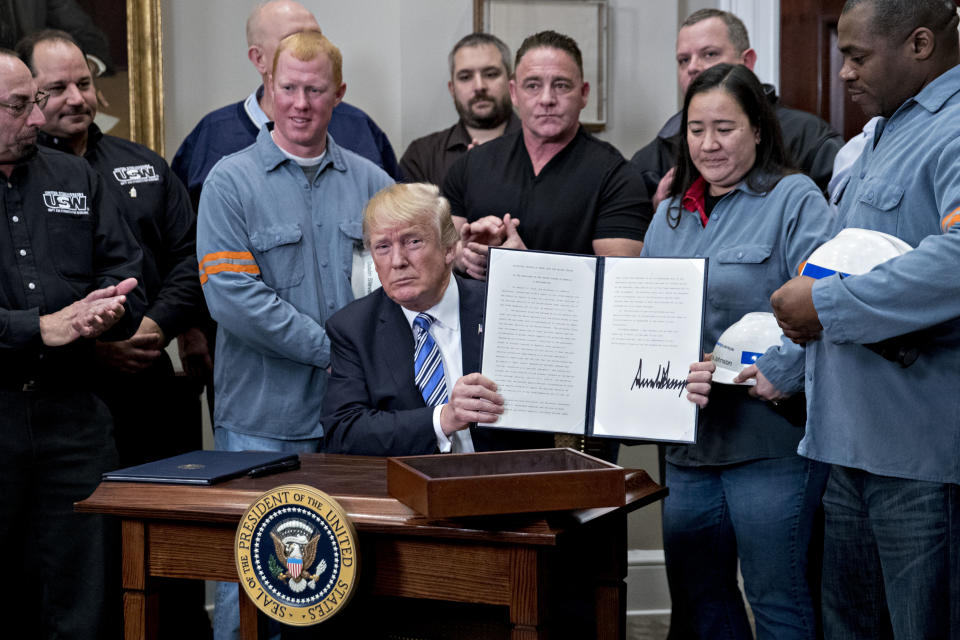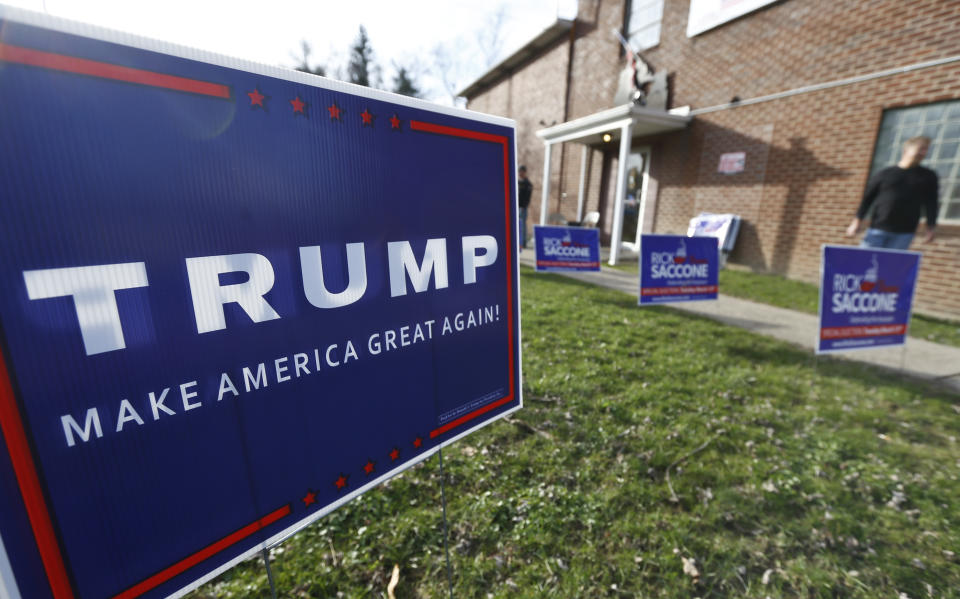Guns, Trump and steel: Next week's Pennsylvania special election a referendum on 2018's hot-button issues

A March 13 special election in the heavily Republican-voting southwest corner of Pennsylvania has turned into a referendum on an array of hot-button issues, and the outcome could shape how candidates campaign around the country and affect debates over American trade policy in the year ahead.
The contest is between Republican Rick Saccone and Democrat Conor Lamb for the 18th District seat that opened when eight-term Rep. Tim Murphy resigned last October. Murphy, a member of the Pro-Life Caucus, quit following reports he had urged his mistress to consider an abortion. The special election has the potential to upend expectations about how safe even the reddest of Republican congressional districts will be in 2018, with implications for control of the House — and the fate of possible impeachment resolutions.
Trump won the district by nearly 20 points, and at the time of Murphy’s resignation National Republican Congressional Committee Chairman Steve Stivers boasted, “The NRCC is undefeated in special elections this year, and I’m supremely confident that will continue.”
But newly energized activists had begun organizing against Murphy and other local Republicans shortly after Trump’s victory with the long-shot goal of taking back the district, which extends from the suburbs of the “Steel City” of Pittsburgh to the West Virginia border. With Murphy out of the way, they found in Lamb, a telegenic 33-year-old former prosecutor and first-time candidate, to embody their hopes.

Saccone, 60, is a state representative and former Air Force special investigator who improbably won his party’s nomination last fall after a falling-out between two other candidates. He is known for his pro-gun and conservative social positions and has said he wants to come to Washington to be Donald Trump’s “wingman.”
With just a few days to go until the election, Democrats are closer than they ever expected. In late February the venerable Cook Political Report moved the race from “leans Republican” to “toss-up,” and recent public polling shows the candidates neck and neck — leading to cautious predictions that Lamb might become the first Democrat to win a hotly contested House special election since Trump took office. Republicans notably lost the special election for Alabama’s U.S. Senate seat, and have lost three dozen state legislative seats across 2017 and 2018. Although Democratic House candidates have generally improved, often by large margins, on Hillary Clinton’s 2016 vote, heavily gerrymandered, highly conservative House districts have proved a formidable seawall against the predicted Democratic wave. If that wall fails here, the wave could become a tsunami.
“I promise you, if he wins you’re going to see probably another half a dozen Republicans say they’re not running again,” former vice president Joe Biden, a native son of Scranton, Pa., said Tuesday during a series of appearances in the district to stump for Lamb. Already a record number of Republican representatives have announced plans to retire, creating openings for the record number of Democratic challengers vying to run in the fall. Incumbent House members had a 97 percent reelection rate in 2016.

President Trump will hold a rally Saturday night in the district and is sure to use the opportunity to tout his newly announced steel tariffs. Vice President Pence has also visited the district. Lamb has proved an adept fundraiser, outraising Saccone two to one, but the candidates’ own spending has been dwarfed by outside money; groups supporting Saccone have poured more than $10 million into the race, giving him a substantial overall financial edge.
The hard dollar discrepancy partly reflects fundraising skill and donor enthusiasm for the candidates, but it also stems from a difference in approach between the two parties in the upcoming cycle. Democrats are unusually focused on funneling funds directly to new-to-the-scene candidate committees for advertising and organizing operations, while Republicans continue to rely heavily on a sophisticated, data-driven party organizing infrastructure and well-established outside groups who have tested and honed their anti-Democratic messaging efforts across multiple successful House elections.
The deployment of on-the-ground volunteers, trained by the Republican Leadership Initiative to bring targeted messages in person to specific individuals identified as persuadable, helped boost Trump in 2016 in Florida, Michigan and Pennsylvania. Party strategists attribute their continued success in holding GOP House seats in part to their ongoing operations. Democrats may have dozens of new resistance-movement groups to turn to, but the GOP has a centralized program with a proven record of fueling high Republican turnout. That could make the difference in a toss-up contest.
And then, of course, there’s the steel question. Southwestern Pennsylvania is dotted with steel plants and coal mines that have seen better days — and things haven’t improved since Trump’s inauguration, despite his promises. At least five manufacturing plants in southwestern Pennsylvania closed in 2017, leading to the loss of thousands of jobs across the already depressed region. In Westmoreland County, which overlaps in part with the 18th District, a steel plant went idle last year. In Mount Morris, the Mepco-owned 4 West coal mine is slated to close this month. “President Trump said he’s bringing back coal, but there’s not been any change in regulations, really, to make a significant difference,” Blair Zimmerman, chairman of the Greene County Board of Commissioners, told NPR when the closure was announced in January. The closing of the mine will cost the region 370 jobs. “We need help,” said Zimmerman.

Accordingly, Trump’s tariff announcement has been greeted with enthusiasm. “Last week, a president stood up for Pittsburgh, and for the Mon Valley, and Weirton, and Youngstown, and all the small American towns that felt the ripple effect of unfettered trade and abandonment of a primary American industry. It was not Donald Trump’s dumbest hour, it was his finest,” opined the Pittsburgh Post-Gazette in an editorial hailing the president for keeping his word to protect the steel industry and issue tariffs.
The American Alliance of Manufacturers and the locally influential Steelworkers Union also cheered and thanked the president, while the AFL-CIO’s president, Richard Trumka, took to Twitter to defend him. “Tariffs won’t start a trade war…. People may not like how Pres Trump rolled these out, but I applaud him for trying,” he wrote.
But it’s far from certain that this late-in-the-game announcement, which already contains an exemption for Canada and Mexico and will almost certainly face court challenges, will be enough to make a difference against the felt reality of plant closures and job losses.
Nor is the race only a referendum on Trump, whose approval in southwestern Pennsylvania had dropped from 60 percent in May 2017 to 40 percent by last fall. Also at issue is House Minority Leader Nancy Pelosi — and the enduring power of advertising against her. The Paul Ryan-affiliated Congressional Leadership Fund has made her a villain in advertising across congressional races for years, and she has figured prominently in their advertising against Lamb.
Lamb, for his part, has said that House Democrats need new leadership and that he would oppose Pelosi’s reelection. But he would need to be joined by a majority of the caucus to have an impact, and that’s not a likely scenario, barring a Democratic collapse in the midterms. And whoever wins Pennsylvania’s 18th District won’t be able to keep the title of its representative for long, given the impending court-ordered redistricting. If the plan now under consideration survives further challenges, voters in the current 18th District would be split between a renamed 14th District and a renamed 17th District. The existing 14th District represented by Democrat Michael Doyle, which includes the Democratic stronghold of Pittsburgh, would be renamed the 18th.

In that scenario, Saccone would be a strong candidate to win the open seat in the new and even more conservative 14th District, while Lamb might be better positioned as a challenger to incumbent GOP Rep. Keith Rothfus in the new 17th District.
Lamb’s home in Mount Lebanon is in the new 17th District, and he has already begun to receive local Democratic endorsements for a possible fall race against Rothfus.
Republicans have sought to tie Lamb to the national party’s position on gun control as well. Lamb, a former Marine captain, has said he does not support a ban on assault weapons, but the ads have continued. It’s a tactic that often works for Republicans, but national polls show that support for some gun control measures is higher than ever before in the wake the Parkland, Fla., shooting.
“In the last two months, some of the biggest surges in support for tightening gun laws come from demographic groups you may not expect — independent voters, men and whites with no college degree,” said Tim Malloy, assistant director of the Quinnipiac University Poll, announcing the findings.
That might mitigate what in other years has been an effective line of attack. One thing is certain: Both parties will be watching the results Tuesday closely for clues about how to position themselves for what could be one of the most consequential midterms in a long time.

Read more from Yahoo News:



